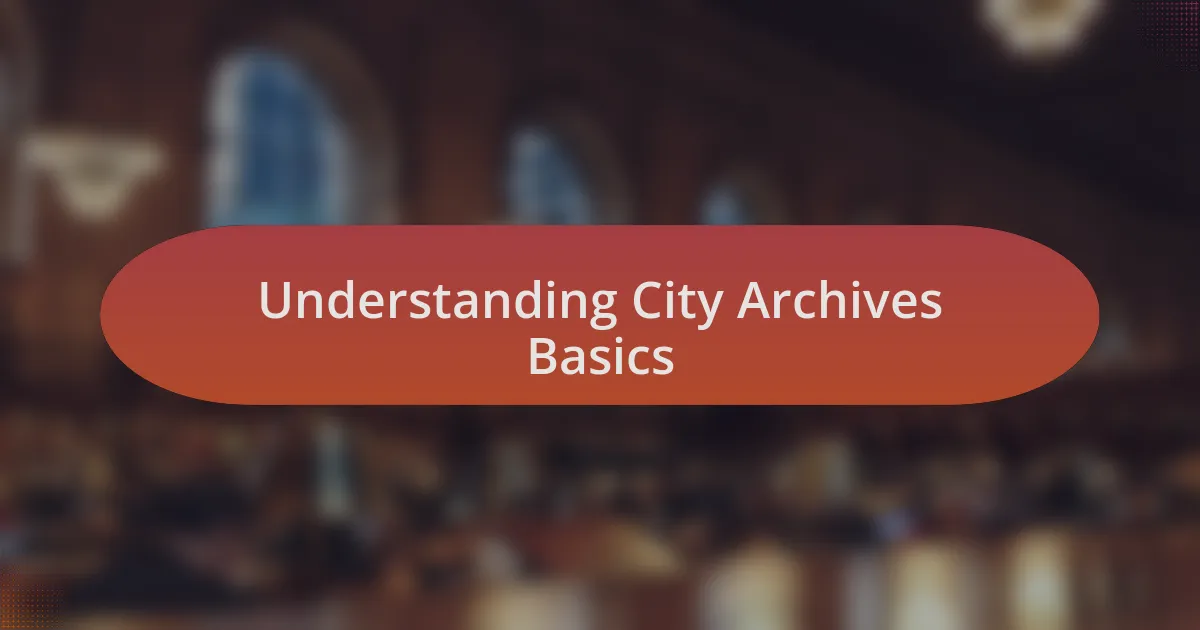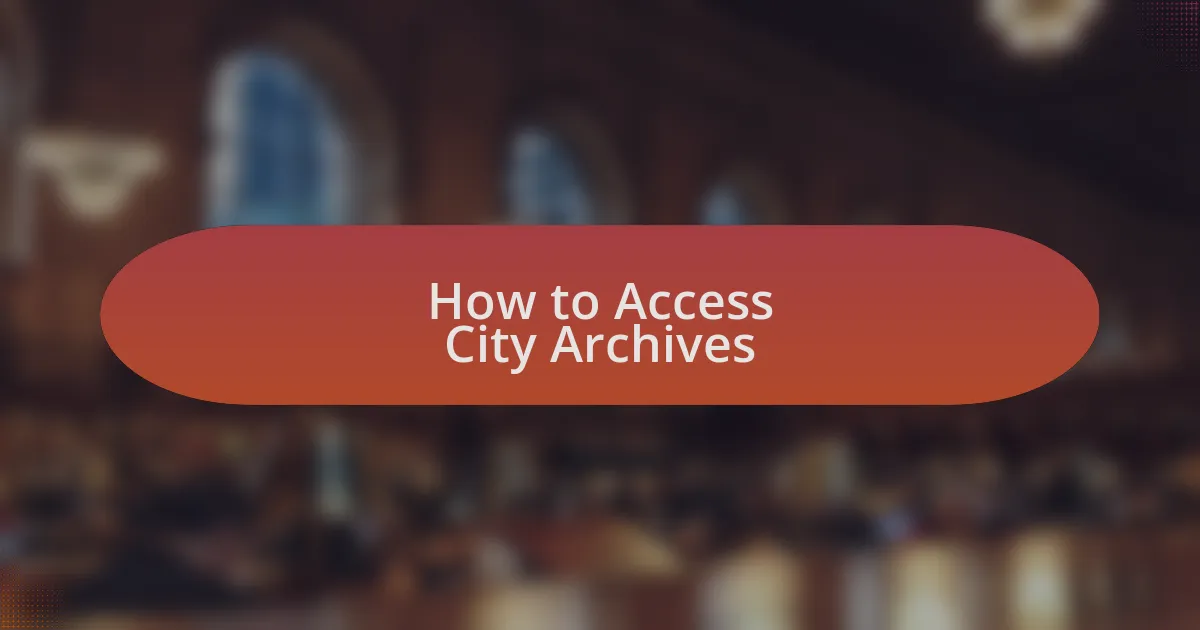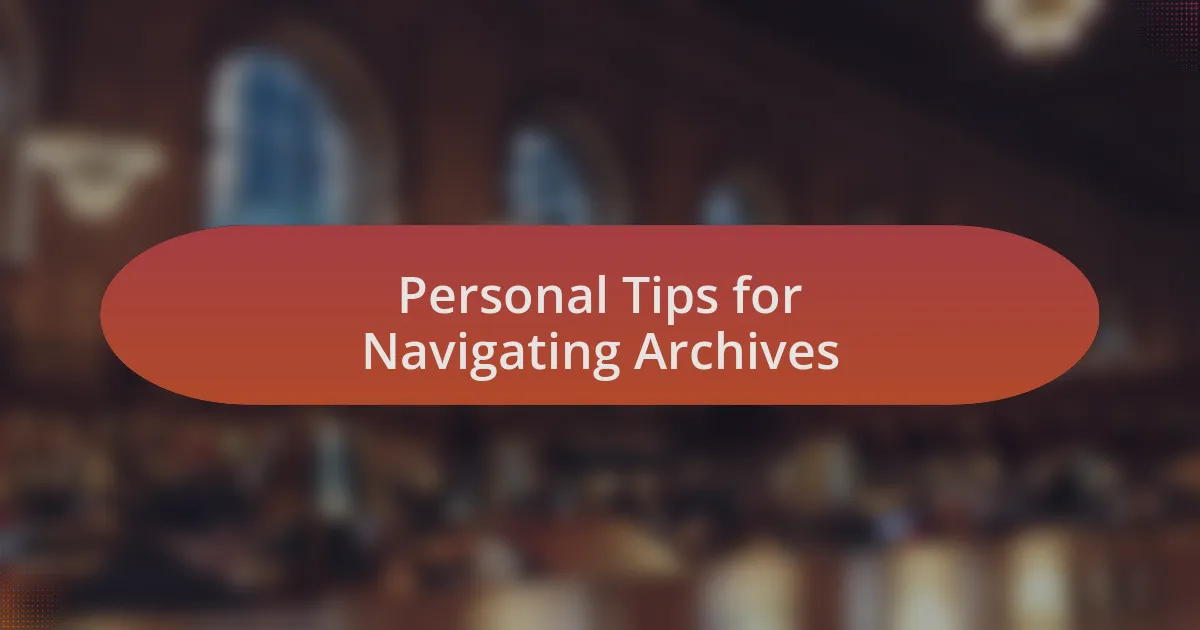Key takeaways:
- City archives are valuable resources for uncovering personal and community histories, often requiring in-person visits to access both digitized and non-digitized records.
- Effective research involves planning, using digital resources beforehand, and maintaining an open mind to unexpected discoveries.
- Engaging with archivists and taking detailed notes can enhance your research experience and help connect key findings.
- Sharing discoveries with others through collaboration or social media fosters community, deepens understanding, and can uncover further historical layers.

Understanding City Archives Basics
City archives serve as treasure troves of historical documents and records, preserving the stories of communities for future generations. I still remember the excitement of stepping into my local archive for the first time, feeling the weight of countless untold stories around me. It prompted me to wonder: what vital piece of my family’s history might be tucked away within those dusty boxes?
Understanding how to navigate these archives can be daunting at first. You might be overwhelmed by the sheer volume of documents, from birth certificates to city council meeting minutes. But I found that approaching it in stages made it manageable; focusing on one specific aspect of my research each visit helped me uncover fascinating details, like the addresses where my ancestors lived.
It’s important to remember that not all records are digitized or indexed online, which means you’ll need to visit in person sometimes. This experience can feel intimate, almost like diving into a personal time capsule. If you’re passionate about your genealogy, this connection to the past is worth every bit of effort. Have you ever felt that thrill of connecting the dots in your family history? It’s a rewarding journey that often leads to unexpected discoveries.

How to Access City Archives
When you first plan your visit to city archives, it’s essential to check their website or call ahead for their hours and any necessary requirements. On one occasion, I arrived only to discover they had a temporary closure for renovations, which taught me the importance of being prepared. Many archives also require an ID for access, so it’s good practice to have that handy.
Once you arrive, take a moment to familiarize yourself with the layout. I remember feeling a bit lost among the rows of file cabinets and stacks of books during my initial visit. However, asking the archivists for guidance proved invaluable—they’re often passionate about history and eager to help you navigate their collections. Don’t hesitate to inquire about specific records related to your family; their expertise can lead you to hidden gems that you might otherwise overlook.
Finally, keep in mind that patience is key. There are times when locating a particular document can feel like searching for a needle in a haystack. I experienced this firsthand when I spent hours combing through various records only to find exactly what I was looking for at the very end of the day. That sense of accomplishment made all the effort worthwhile. Have you ever felt that rush when uncovering a vital piece of information? It can turn an ordinary day into an extraordinary one.

Strategies for Effective Research
When researching in city archives, start by creating a focused plan to guide your search. I remember my first visit where I was overwhelmed by the sheer volume of records. By prioritizing what I wanted to find—like census data or immigration records—I was able to streamline my efforts and make the most of my time there. Have you ever felt uncertain about where to begin your search? Trust me, a little organization goes a long way in easing that anxiety.
Another effective strategy is to leverage the available digital resources before your visit. Many archives have databases you can explore online, which can help you identify specific documents or leads. On one occasion, I stumbled upon a digitized newspaper article that mentioned a family member I’d been searching for. It felt like serendipity, and it significantly shaped my focus for that trip. Have you searched online archives yet? It’s an excellent way to get a head start and build anticipation.
Lastly, maintain an open mind throughout your research. Sometimes, the most rewarding discoveries come unexpectedly. I recall discovering a family relation while looking through church records—something I didn’t think would be relevant at all. The thrill of connecting dots in my family history reminded me to explore various types of records, as they might lead to fascinating paths. Have you found surprising connections in your own genealogical journey? Embracing the unknown can be incredibly enriching.

Personal Tips for Navigating Archives
When you’re deep in the stacks of city archives, don’t hesitate to ask for help. The archivists are often passionate about their work and can provide invaluable insights. I’ll never forget the time I approached one and shared what I was looking for. Their guidance not only pointed me to resources I hadn’t considered but also transformed a daunting search into a meaningful exchange. Have you ever had a moment where a simple question opened new doors? It’s those interactions that can make your research feel less like a solo mission and more like a collaborative adventure.
I highly recommend taking notes—lots of them. In the past, I found myself juggling a multitude of facts and names without a clear record of what I had uncovered. This led to frustration when I couldn’t recall which document held that key piece of information. Now, I bring a notebook where I not only jot down findings but also my thoughts and questions as they arise. This practice has helped me feel in control and has often sparked new ideas. How do you keep track of your discoveries when delving into archives? Writing it all down can be more powerful than you might think.
Lastly, don’t rush your visits. I once planned a full day in an archive, only to find that my mind felt foggy by mid-afternoon. Recognizing my limits, I began scheduling shorter, more focused trips. This approach allows me to savor the materials, reflect on what I’ve learned, and truly enjoy the experience. Have you ever felt the weight of too much information? Slowing down can lead to more profound connections and insights, making each visit a memorable stop in your genealogical journey.

Sharing Your Findings with Others
When you finally piece together a fascinating family story, sharing that discovery becomes just as important as the research itself. I remember unveiling an unexpected connection to a historical figure that had shaped my hometown. Excitement bubbled inside me as I rushed to share the news with fellow genealogists in an online forum. Their reactions and insights not only validated my findings but also ignited discussions that led to even deeper revelations. Doesn’t it feel rewarding to know others are just as intrigued by your journey?
Collaboration can open doors to discoveries you never anticipated. A few years back, I teamed up with distant relatives I met online. We exchanged documents and photographs, and together we uncovered layers of history that each of us had been blind to before. This sense of camaraderie is what makes genealogy a shared adventure. Have you considered reaching out to others who share your lineage? You might be surprised at what you can uncover together.
Don’t underestimate the power of social media and community groups in amplifying your research. On one occasion, I decided to post a blog detailing my findings and the stories behind them. The response was overwhelming—comments poured in from people with similar interests or connections to the story I had told. It was heartwarming to see how sharing not only expanded my own understanding but also connected others. What stories or questions are waiting for you to share? Engaging with a community can take your discoveries to new heights.